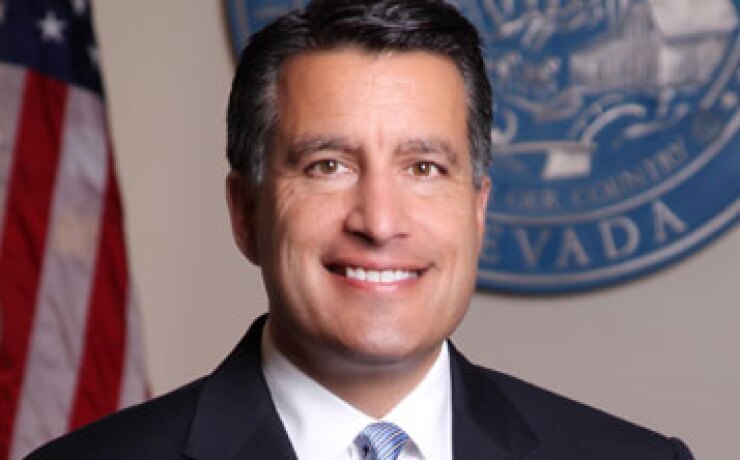
LOS ANGELES — Brian Sandoval, Nevada's Republican governor, overcame critics in his own party to push through a tax package that is expected to steer the state onto sounder fiscal ground.
"In general, it's favorable from a credit perspective that it looks as though Nevada will avoid disruption and the uncertainty that comes with beginning a new fiscal year without an enacted budget in place," said Gabriel Petek, a Standard & Poor's analyst.
Lawmakers worked tirelessly to "set Nevada on a new course toward prosperity and opportunity," during the four-month legislative session that ended Tuesday, Sandoval said in a statement Tuesday.
"This session we enacted generational reforms that will transform the way we deliver education, made an unprecedented investment in our public education system, and implemented policies that will further propel our economic recovery," the governor said.
The tax package makes permanent temporary sales and payroll taxes first enacted in 2009 and extended twice afterward; bumps the payroll tax up; and creates a commerce tax on gross revenue.
Sandoval designed the changes to fund his proposed education reforms, which includes a requirement that third graders will be able to read before moving on to fourth grade and provides "school choice" money for parents who send their children to private school.
The state also passed legislation in March that allows school districts to issue general obligation debt without voter approval.
Moody's Investors Service deemed that a credit positive for Clark County School District, the fifth-largest school district in the nation.
"Under the new legislative authority, the district estimates it can issue approximately $4 billion in debt over the next decade to address its $7.3 billion in current capital needs rooted in enrollment growth," according to the March 24 Moody's report.
The tax proposals balanced the $7.4 billion budget, but Sandoval had to overcome vocal opposition from members of his own party to get them passed.
During the 120-day legislative session, a sometimes vicious battle ensued over the tax increases.
Some of the opposition came from conservative Republicans, who gained control of both houses in the November election, the first time in decades the GOP has controlled both houses.
The 2015 legislature "will be remembered as a proud chapter of the Nevada story," Sandoval said in his June 2 statement.
"The legacy left by this body has laid the foundation for the New Nevada which will improve our state for generations to come," he said.
Sandoval's battle with his own party to raise taxes represents his own transition into a centrist, who learned during his tenure as governor to work with Democrats to achieve legislative goals.
Sandoval ran on a promise he would not raise taxes in 2010, but a budget shortfall and pressure from the then-majority Democratic legislature forced him to support an extension of temporary tax increases in the 2011 session, drawing criticism from some fellow Republicans.
The Nevada Supreme Court forced Sandoval's hand at that time when it raised questions about the legality of taking tax dollars from local governments to fund state government, as Sandoval had proposed in his original budget. The Legislature passed a $6.2 billion spending plan for the 2011-13 biennium.
"Since 2009, the legislature has had to enact temporary taxes that brought the risk that they would not be extended," said Julius Vizner, a Moody's Investors Service analyst. "What the 2015 legislature did was make those temporary taxes permanent."
The legislature also approved about $500 million in new taxes, which are mostly business taxes, Vizner said.
Ever since the 2009-2011 budget biennium, Nevada has been relying on the package of temporary taxes.
"The revenue plan makes those taxes permanent and modernizes the state's gross receipts tax structure on businesses," Petek said. "We expect the more predictable revenue base will be beneficial to the state's fiscal outlook."
Sandoval was not the lone Republican to abandon a "no new taxes" stance to pass his so-called Nevada Revenue Plan. In order to get the plan through the legislature, 48 lawmakers out of 63 voted in favor.
The state has long received double-A ratings on its general obligation bonds, because of its conservative approach to issuing debt.
It holds AA-plus, AA, and Aa2 ratings from Fitch Ratings, Standard & Poor's and Moody's respectively on its general obligation bonds. Those ratings were all affirmed in February when the state sold $310 million in GO bonds in a competitive sale.
The $162 million budget gap Nevada's Interim Finance Committee projected in November for the current fiscal year ending June 30 threatened those ratings. Moody's Investors Service deemed the projected shortfall a credit negative in a Dec. 15 report.
Weak gambling and mining revenues and higher-than-expected school enrollment, which pressures state spending upward, were cited as the causes for the anticipated budget gap in Moody's December report.
Nevada was the state hardest hit by the economic crash of 2009, in part because its commercial and residential building boom surpassed other states, Vizner said.
When the bottom fell out of the U.S. economy - and the real estate market - it took Nevada with it.
Unemployment in the Silver State soared to more than 14% during the height of the recession. The state's jobless rate dropped to 7.1% as of March, according to the U.S. Bureau of Labor Statistics.
S&P hasn't issued a formal report on Nevada's budget, expected to be signed by the governor within days.
In a May budget report, S&P noted that the state was working to close a relatively large budget gap and that part of the proposed solution was the governor's tax plan.
"The state had been projecting a large budget gap and with this agreement, it would appear that the projected shortfall is now closed," Petek said. "The Nevada Revenue Plan, as it's being called, is helpful from a structural standpoint."





